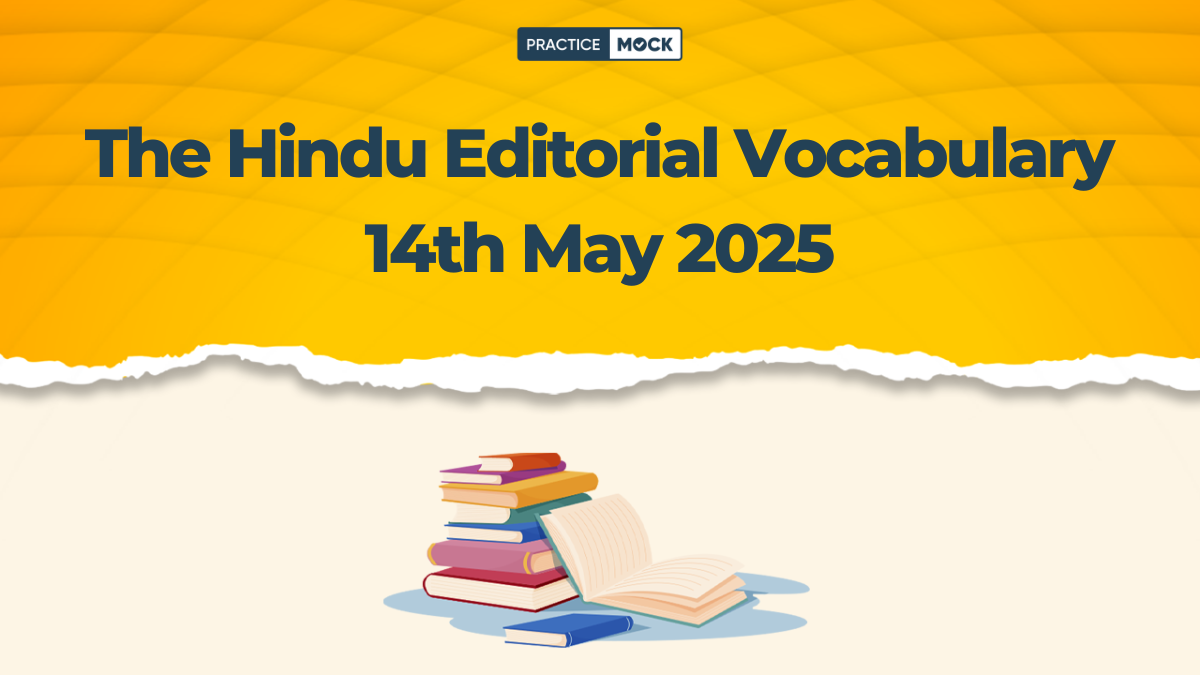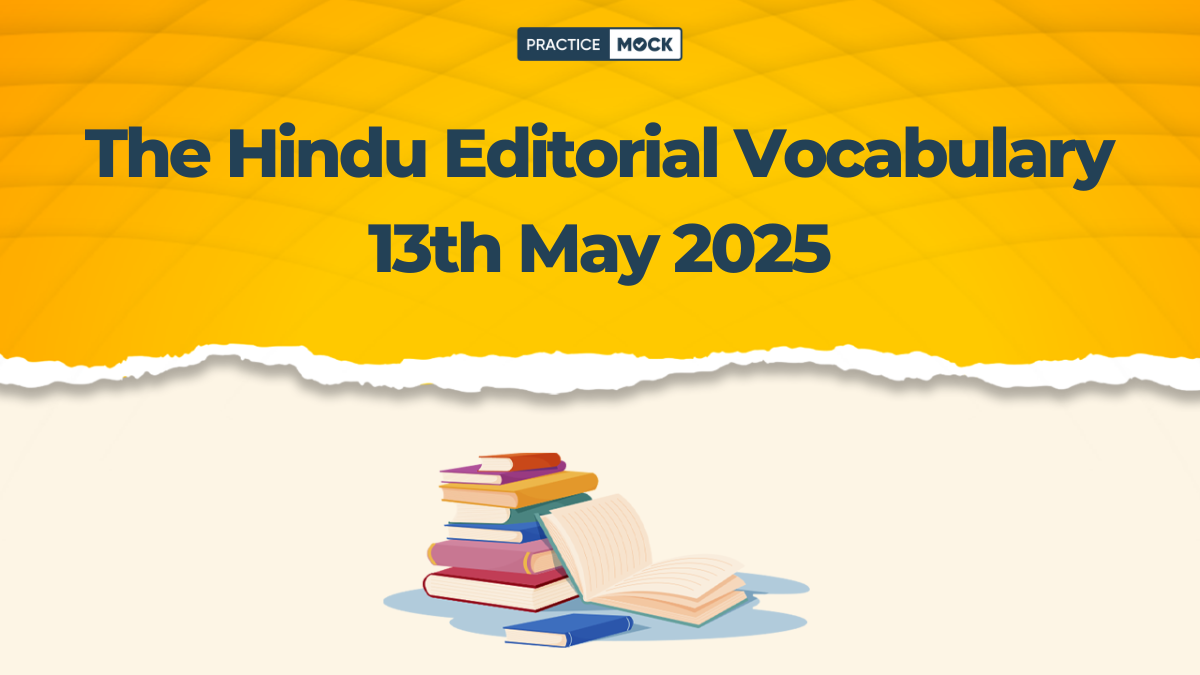The Hindu Editorial Vocabulary– December 22, 2023; Day 517


| Difficult Word/ Phrase | Contextual Sense |
| Prevalence | The fact that something is very common or happens often |
| Descendent | Proceeding from an ancestor or source |
| Dominant | Important, strong, or noticeable than anything else of the same type: |
| Lineage | All the things that are related directly to the same living thing that existed long ago |
| Mutation | An alteration in the genetic material (the genome) of a cell of a living organism or of a virus that is more or less permanent |
| Enhances | To improve the quality, amount, or strength of something |
| Transmissibility | The fact of a disease, etc. being able to be passed from one person or animal to another |
| Prompt | To make something happen |
| Variant | Something slightly different from other similar things |
| Evidence | Facts, information, documents, etc. that give reason to believe that something is true |
| Fatality | A death caused by an accident or by violence, or someone who has died in either of these ways |
| Detect | To discover or determine the existence, presence, or fact of something |
| Isolation | The condition of being separated from other people, towns, and countries. |
| Sustain | To cause or allow something to continue for a period of time |
| Surveillance | To keep a careful watch on someone or something |
| Integrity | The quality of being honest and having strong moral principles |
| Communalised | (Of Conflict) between different communities, especially those having different religions or ethnic origins |
Staying alert: On the rapidly increasing spread of the JN.1 variant
India must sustain focus on genome sequencing for novel variants
The rapidly increasing spread of the JN.1 variant across the globe has led to the prevalence (the fact that something is very common or happens often) of this variant, a descendent (proceeding from an ancestor or source) of the BA.2.86 Omicron lineage, reaching over 27%, marking an eight-fold increase in just a month. First identified in Luxembourg in late August this year, the JN.1 variant has also become the dominant (important, strong, or noticeable than anything else of the same type) variant in a few countries. The variant is very likely to become the dominant strain globally. Compared with the parent lineage (All the things that are related directly to the same living thing that existed long ago) BA.2.86, the JN.1 variant carries an additional mutation (an alteration in the genetic material (the genome) of a cell of a living organism or of a virus that is more or less permanent) L455S in the spike protein, which enhances its immune evasion significantly.
Like other Omicron sublineages, the JN.1 variant too has high transmissibility (the fact of a disease, etc. being able to be passed from one person or animal to another). The winter season in the northern hemisphere will thus make it easier for the virus to spread. Despite increased immune escape capability and transmissibility, no major outbreak has been reported so far. Prompted (to make something happen) by the presence of the JN.1 variant in most countries and its rapidly increasing spread, the World Health Organization classified JN.1 as a separate variant (something slightly different from other similar things) of interest a couple of days ago; JN.1 was previously tracked as part of BA.2.86 but now accounts for “vast majority” of the BA.2.86 lineage. Based on available limited evidence (facts, information, documents, etc. that give reason to believe that something is true), the global health body has noted that JN.1 is not associated with increased disease severity compared with other circulating variants. Evidence from countries that have reported a surge in cases and hospitalisations driven by the JN.1 variant does not suggest higher fatality (death caused by an accident or by violence, or someone who has died in either of these ways). Though the first COVID-19 case caused by the JN.1 variant was detected (to discover or determine the existence, presence, or fact of something) in Kerala during routine surveillance, Goa has reported the greatest number of cases so far — 19. India has so far reported 21 JN.1 cases in all.
All the 21 cases have been clinically mild, requiring home isolation (The condition of being separated from other people, towns, countries). In the last fortnight, India has registered a sharp increase in the number of COVID-19 cases. While universal masking should surely not be made mandatory at this point in time, it is highly desirable that high-risk individuals mask up especially in poorly ventilated closed spaces as COVID-19 deaths in people with comorbidities are still being reported in India. In a welcome move, all patients with influenza-like illness (ILI) and severe acute respiratory infections (SARI) are being tested for COVID-19, and positive cases are sequenced as part of the revised surveillance (to keep a careful watch on someone or something) guidelines. Likewise, there should be sustained (to cause or allow something to continue for a period of time) focus on genome sequencing for novel variants. Finally, India should learn from past mistakes and refrain from shaming States that report more cases and/or novel variants. States that have better surveillance and display greater integrity (the quality of being honest and having strong moral principles) in testing and reporting are bound to register more cases. Public health should neither be communalised (Of Conflict) between different communities, especially those having different religions or ethnic origins) nor politicised.
Want to improve your vocabulary further? Download the Lists of Word-Meanings of Previous Months here.
Recent Posts
RRB NTPC Application Status 2025 Out, Check Your Application Status
The RRB has released the RRB NTPC Application Status 2025. In this blog, we have…
How to Prepare Quant for IBPS PO 2025 Prelims Exam, Check Strategy to Score 30+ Marks
Here we are providing the strategy to prepare the Quant section for the prelims exam.…
IBPS PO Eligibility Criteria 2025, Check Bank PO Age Limit and Educational Qualification
IBPS PO Eligibility Criteria highlights eligibility for the post of probationary officer at a public…
IBPS Clerk 2025 Notification in October, Check Exam Date
The IBPS Clerk Notification 2025 will be released on their official website. Candidates can check…
Medieval History of India PDF for SSC CGL, Download for Free
In this blog, we have provided the Medieval History of India PDF for SSC CGL.…
DI Expected Questions for RRB PO 2025, Check How to Solve It Easily?
In this article we are providing the 100 + DI Repeated Questions for RRB PO…


